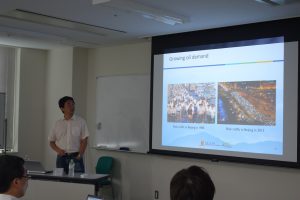[開催報告] Climate change is playing a major role in shaping energy policy and economic transformation. This talk briefly proposed a hypothesis that the costs of climate mitigation could be largely offset by non-climate, domestic co-benefits. Correspondingly, a “Giant Panda Strategy of Climate Change”, inspired by the flagship species strategy in ecological conservation, is contemplated for a country to more actively embrace climate change in its overall governance strategy. Furthermore, three major topics of his current research that centre around climate mitigation-related technologies was discussed. First, a theory of energy transition is being explored. Renewable energy has been gaining momentum in the competition with fossil fuels. However, major countries have different choices among different renewables, especially wind and solar. This long-term and collaborative research aims to gradually work toward a generalizable theory to explain and guide a country’s energy transition toward renewables. Second, CO2 capture, utilization and storage (CCUS) is a critical but not yet widely deployed technology for decarbonizing fossil fuel consumption. Previous studies generally put the entire chain within one country, while we propose to stretch the chain across countries and are assessing the technological, economic, political and policy feasibilities. Taking the same maritime routes as oil and natural gas are shipped to East Asia, liquefied CO2 will be shipped back for enhanced oil/gas recovery and CO2 storage in oil/gas exporting countries. One question under examination is whether those oil/gas exporters could sustainably serve as global CO2 sinks. Third, pollution and CO2 monitoring technologies in the category of Big Data have been rapidly emerging. Inspired by a public health strategy in epidemiology, a new system was designed to integrate these new, not-accurate-enough but much cheaper technologies, mainly to screen emitters, for catching more environmental non-compliance at lower costs and implementing pollution and CO2 mitigation policies. This research calls for a fundamental reform of the current environmental compliance monitoring system through reallocating resources for utilizing these new technologies.

■日時:2018年 7月11日(水)15:30-17:30
■場所:東京大学本郷キャンパス 国際学術総合研究棟12階 演習室E
■言語:英語
■参加費:無料
演者:Yuan XU, Associate Professor, Department of Geography and Resource Management, The Chinese University of Hong Kong(香港中文大学)

Prof. Yuan XU is an associate professor in the Department of Geography and Resource Management and leads the Environmental Policy and Governance Programme in the Institute of Environment, Energy and Sustainability, The Chinese University of Hong Kong. His research centers on energy and environmental policies and strategies, especially on their implementation for achieving energy development and pollution mitigation goals as well as related technological innovation and industrial development. Before joining CUHK in August 2010, Prof. Xu received a Ph.D. degree in public policy from the Woodrow Wilson School of Public and International Affairs, Princeton University and was a postdoctoral research associate in the Industrial Performance Center, Massachusetts Institute of Technology. He also holds an M.S. degree in climatology, a B.S. degree in atmospheric sciences and a bachelor’s degree in economics, all from Peking University.
■申込み:事前登録が必要です。こちらの フォーム から。
※登録フォームが開けない方は、メールにて、STIG@pp.u-tokyo.ac.jpまで所属、お名前をお知らせください。
問い合わせ先:STIG教育プログラム事務局
STIG@pp.u-tokyo.ac.jp
06.20.2018